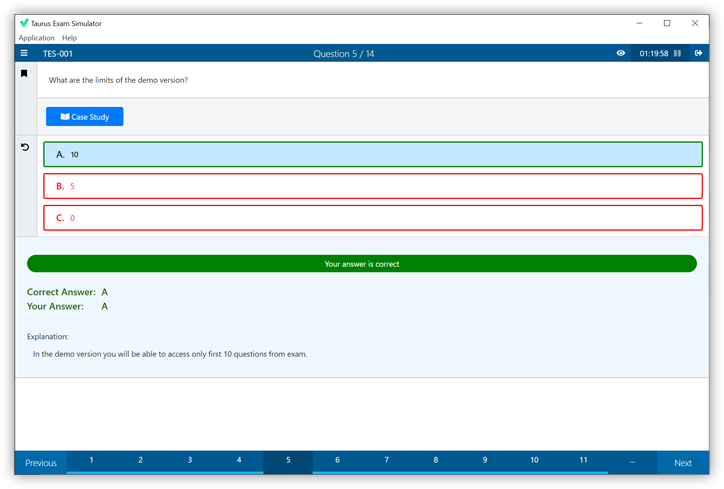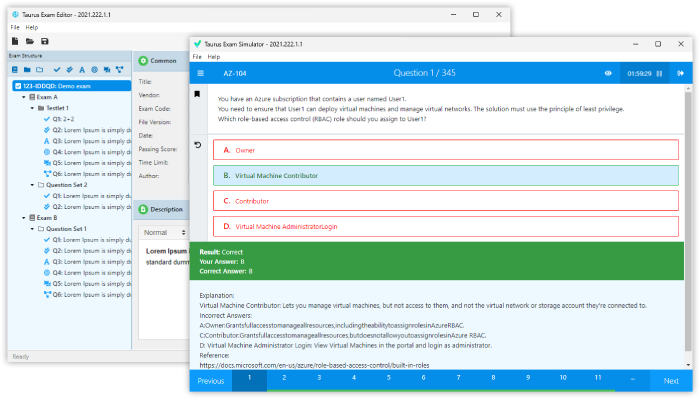Download PMI.CAPM.PracticeTest.2019-02-24.470q.tqb
| Vendor: | PMI |
| Exam Code: | CAPM |
| Exam Name: | Certified Associate in Project Management |
| Date: | Feb 24, 2019 |
| File Size: | 3 MB |
Demo Questions
Question 1
Which changes occur in risk and uncertainty as well as the cost of changes as the life cycle of a typical project progresses?
- Risk and uncertainty increase; the cost of changes increases.
- Risk and uncertainty increase; the cost of changes decreases.
- Risk and uncertainty decrease; the cost of changes increases.
- Risk and uncertainty decrease; the cost of changes decreases.
Correct answer: C
Question 2
Which tool or technique is an examination of industry and specific vendor capabilities?
- Independent estimates
- Market research
- Analytical techniques
- Bidder conferences
Correct answer: B
Explanation:
12.1.2.3 Market Research Market research includes examination of industry and specific vendor capabilities. Procurement teams may leverage information gained at conferences, online reviews and a variety of sources to identify market capabilities. The team may also refine particular procurement objectives to leverage maturing technologies while balancing risks associated with the breadth of vendors who can provide the materials or services desired. 12.1.2.3 Market Research
Market research includes examination of industry and specific vendor capabilities. Procurement teams may leverage information gained at conferences, online reviews and a variety of sources to identify market capabilities.
The team may also refine particular procurement objectives to leverage maturing technologies while balancing risks associated with the breadth of vendors who can provide the materials or services desired.
Question 3
An input used in developing the communications management plan is:
- Communication models.
- Enterprise environmental factors.
- Organizational communications.
- Organizational cultures and styles.
Correct answer: B
Explanation:
10.1.3.1 Communications Management Plan The communications management plan is a component of the project management plan that describes how project communications will be planned, structured, monitored, and controlled. The plan contains the following information:Stakeholder communication requirements; Information to be communicated, including language, format, content, and level of detail; Reason for the distribution of that information; Time frame and frequency for the distribution of required information and receipt of acknowledgment or response, if applicable; Person responsible for communicating the information; Person responsible for authorizing release of confidential information; Person or groups who will receive the information; Methods or technologies used to convey the information, such as memos, e-mail, and/or press releases; Resources allocated for communication activities, including time and budget; Escalation process identifying time frames and the management chain (names) for escalation of issues that cannot be resolved at a lower staff level; Method for updating and refining the communications management plan as the project progresses and develops; Glossary of common terminology; Flow charts of the information flow in the project, workflows with possible sequence of authorization, list of reports, and meeting plans, etc.; and Communication constraints usually derived from a specific legislation or regulation, technology, and organizational policies, etc. The communications management plan can also include guidelines and templates for project status meetings, project team meetings, e-meetings, and e-mail messages. The use of a project website and project management software can also be included if these are to be used in the project. 10.1.3.1 Communications Management Plan
The communications management plan is a component of the project management plan that describes how project communications will be planned, structured, monitored, and controlled. The plan contains the following information:
- Stakeholder communication requirements;
- Information to be communicated, including language, format, content, and level of detail;
- Reason for the distribution of that information;
- Time frame and frequency for the distribution of required information and receipt of acknowledgment or response, if applicable;
- Person responsible for communicating the information;
- Person responsible for authorizing release of confidential information;
- Person or groups who will receive the information;
- Methods or technologies used to convey the information, such as memos, e-mail, and/or press releases;
- Resources allocated for communication activities, including time and budget;
- Escalation process identifying time frames and the management chain (names) for escalation of issues that cannot be resolved at a lower staff level;
- Method for updating and refining the communications management plan as the project progresses and develops;
- Glossary of common terminology;
- Flow charts of the information flow in the project, workflows with possible sequence of authorization, list of reports, and meeting plans, etc.; and
- Communication constraints usually derived from a specific legislation or regulation, technology, and organizational policies, etc.
The communications management plan can also include guidelines and templates for project status meetings, project team meetings, e-meetings, and e-mail messages. The use of a project website and project management software can also be included if these are to be used in the project.






